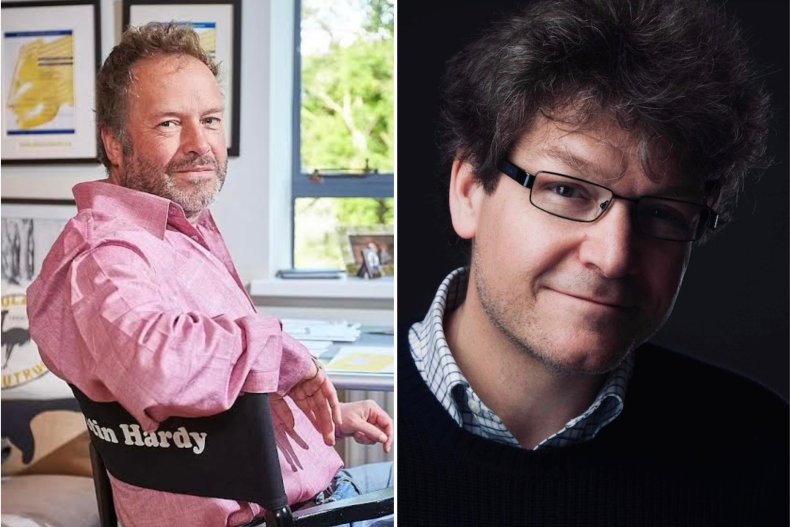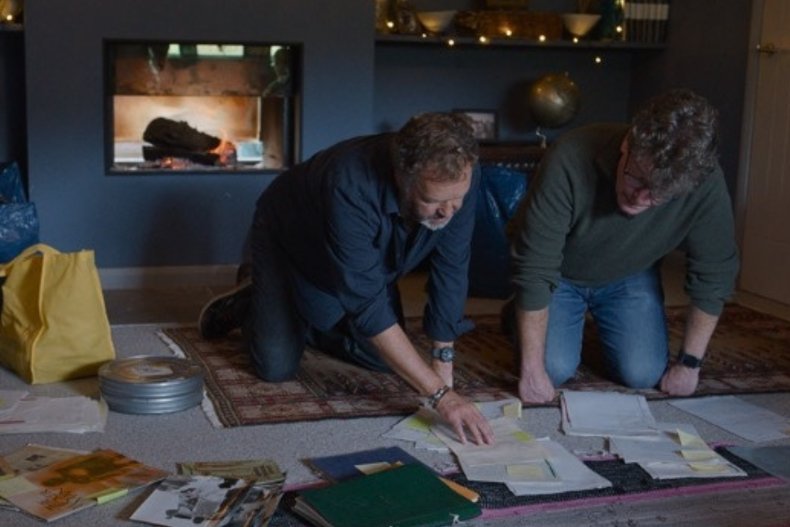Justin Hardy and Dominic Hardy are the sons of Robin Hardy, director of The Wicker Man. The brothers are currently making Wickermania!, an upcoming documentary about their dad's 1973 cult classic folk horror masterpiece. The brothers have launched a Kickstarter to fund the final post-production stages of the film.
Justin Hardy
I get told all the time that I am so lucky to be the son of Wicker Man's director, Robin Hardy, especially as the film and its enduring legacy turns 50.
So maybe it's time, on its anniversary, to finally tell the truth: No, I am not lucky.
The film did me nothing but harm—it bankrupted my father, tore apart my parents' marriage, caused us to sell our house to pay the debts, and even still, after all the success the film has had, we haven't seen a penny.
My half-brother Domi and I got sent Dad's papers, scripts, and storyboards—a whole office from the 1970s that was dedicated to The Wicker Man production. What a treasure trove for a film lover!
Again, no: Instead, a descent into a personal hell as the papers revealed how much my mother had bankrolled our dad and his desperate attempts to become a filmmaker, alongside his advertising partner, Tony Shaffer, already a movie star-writer.
Dad wrote mum a letter saying: "Why did I so want to make the film? Why did Ahab want to kill his whale?"
The letter was the last he spoke to mum before he left her with all of his remaining debts after the film bombed at the box office. He didn't deign to speak to her again for the next five years, during which time she was forced to divorce him on the grounds of not knowing whether he was still alive.

This letter was one of many we found. Another indicated how much money Mum had plowed into dad's preproduction of The Wicker Man: One refers to loans from her of over £27,000—which in 1972, amounts to over £300,000 ($391,000) today.
She had paid for his test shoot of The Blossom—done to prove his commitment to Christopher Lee, Tony Shaffer, and British Lion, the eventual studio. She and dad had stayed in the same hotel room—a moment of happiness for her, one hopes, as her husband sought to achieve his goal of being a filmmaker.
But after all the loyalty, all the support, she was roundly forgotten. By dad, the production, and indeed the whole commercial enterprise. When the film became a standout success five years after its release, nobody called mum to say "Well done, you backed the right horse, here's a cheque—and it will be the first of many."
Not that she would have cared. She only wanted one thing—to have her husband back.
She was a product of the war, and loyalty was her guiding light. Sadly, that quality was not valued by the film business.
So, when I get asked: "Aren't you lucky?" The answer remains quite unequivocally no. And more to the point neither was my dear, loyal, kind mother. She died broken-hearted at 51 years old, unacknowledged.
Hence, our determination to bring her back into the light with our feature documentary. Domi, her stepson, remembers her fondly too—as a gentle stepmother to all of dad's seven internationally sown spawn.
Thanks, Caroline Juliet Helen Hardy, unofficial executive producer of The Wicker Man, you backed the right film. You were a clever investor, and a canny film supporter.
We call upon all Wicker Maniacs to raise their hands to the Sun Goddess in your honor: Not so much to Robin Hardy, overpraised director, but to you, beloved mother to all.
Dominic Hardy
My family was my mother Elizabeth and I. Robin Hardy was a fledgling documentary and advertising filmmaker working out of borrowed flats in Montreal and New York when I came along.
By the time this strange sibling called The Wicker Man was born—a child usurping the seven that preceded it—I was twelve.
I was sent in December 1972 to spend Christmas with my London family: Dad, stepmother Caroline, whom I adored, little brother Justin, and little sister Arabella.
In the days just before New Year, dad included me in a party that set out to a private screening room in Soho. There, he presented us with the as-yet-unedited, first rough cut of The Wicker Man.
The effect of the eroticism and of the terrifying ending on a 12-year-old boy can be imagined. When I returned to Montreal, I figured out that I'd spent, by then, a grand total of 72 days with my father in all my twelve years. The bulk of these were in annual summer visits to him that had begun three years earlier. In that time, I had found him and already nearly lost him.
In May 1971, aged only 42, he suffered a massive heart attack. He was a lucky survivor. Elizabeth still carried a flame for him. A single mum working full-time, she depended on his already peripatetic support payments. We had no understanding of how his finances worked. We knew he was wiped out.
In retrospect and with the analysis of the documents that have recently come to Justin and me, his finances bore a family resemblance to a pyramid scheme. The support payments never resumed.
I was obsessed with this distant god, my father, whose presence began to be more and more elusive. Every day might bring a letter from him; every phone call might be his. In the spring of 1972, Caroline sent me a postcard from Scotland where they were ensuring Dad had a restorative holiday after another heart incident, all while still working on The Wicker Man.

Then, by Christmas, it was made; and in the spring of 1973, I would scan the Montreal papers, French and English, naïvely believing that the film would be advertised, that it was coming. But it never did.
There was another summer visit, a holiday up the Thames with Caroline, Justin and Arabella, in 1974: Dad was working at something every day in London. His Bentley of yore had given way to a DAF, The Wicker Man was not spoken of, even though it had won a prize in Paris in April.
Elizabeth had written to him: "Dominic is thrilled with your prize. I hope this recognition translates into earnings and the resumption of your support payments. Bringing up a teenage boy is very expensive."
He had already told me I'd have been better off if he'd died, for there was insurance that provided for his family. And then, my London family was no more. No word from Robin Hardy until he surfaced in the U.S. in 1976.
It was Caroline who told me he'd left them. Left is too soft a word.
Abandoned: As in a ship, only the captain saves himself and lets women and children go down. In a harrowing parallel, Elizabeth began her own long decline. She'd been a lifelong "serial survivor" escaping abuse in a rural family, shining in university, and becoming a trilingual intellectual. She too had been through the fiction of family with Robin Hardy, but it had only lasted a year.
His reality was the illusion of scaling the heights of Hollywood. The Wicker Man was to be his calling card for a life of optioned scripts, good money perpetually chasing after bad, more borrowed flats, and seasons at the Beverly Hills Hotel. The Wicker Man allowed him to reach the heights of his true ambition: To make and immediately spend vast sums of money in search of another film.
In doing this, he liquidated—a term whose totalitarian meaning I call to advisedly, with its overtone of cruel arbitrary action—one after another of his family entanglements. He also liquidated the promise of artistic integrity that reached its summit in The Wicker Man. The personal integrity had been dispensed with long before.
For me, I recognize how much I, as a star-crossed son longing to be recognized as such, enabled him throughout his lifetime to occupy the role of father, of artist: Because only I could confer legitimacy on myself by attributing it to him.
The Wicker Man, then, is the gulf I navigated, it was about the distance to be crossed to reach my father.
After the first visceral impact, it was a satellite in orbit, always there, or rather, somewhere. Only with our father's passing have I really come to gauge the artistic importance of the film, and more, become truly close to my brother Justin, truly beginning to make family with him.
As the illusory father disappears, I welcome the real brother.
All views expressed in this article are the author's own.
Do you have a unique experience or personal story to share? Email the My Turn team at myturn@newsweek.com








